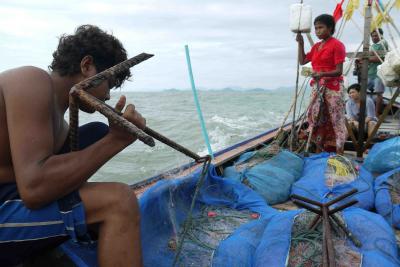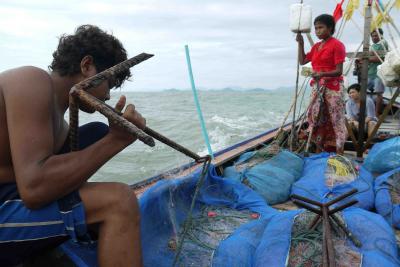
Credit: Nathan Bennett, University of Washington/University of British Columbia
Ocean conservation is essential for protecting the marine environment and safeguarding the resources that people rely on for livelihoods and food security. But there are many documented cases where conservation has bumped up against the people who share the same places and resources, even leading to human rights abuses.
"Often the impacts of marine protected areas can undermine people's rights or stop them from doing their livelihoods," said Bennett, lead author of a new study published today in Marine Policy and a postdoctoral fellow at the University of British Columbia and the University of Washington. "There is a real danger that in pushing for marine conservation, socially unjust or inappropriate actions could be promoted, including those leading to displacement, violence, marginalization and poverty."
Both the UN Sustainable Development Goals and Aichi Targets have set goals to have 10% of the ocean be designated as marine protected areas by 2020. But currently there are no standards for how conservation is done. Doctors, lawyers, engineers and many other professions have codes of conduct, should one exist for conservation?
A global group of oceans science practitioners and scientists argue yes – it is "warranted, urgent and past due", in their new paper "An appeal for a code of conduct for marine conservation". In it, they outline what that code could look like, with considerations for fair governance, social justice and accountability practices. This code could be widely used by governments, researchers, NGOs, private sector and local organizations to review such issues around human rights, indigenous rights, food and livelihood security, benefit sharing, conflict resolution, and more.
"This is urgent, we need thoughtful actions to conserve the marine environment, but we need to do it in an equitable way, with respect for fishers' livelihoods, food sovereignty and dignity," said Yoshitaka Ota, co-author and Nippon Foundation-UBC Nereus Program Director of Policy. "Most importantly, conservation is the art of finding a better way to live with the environment because we will always be a part of it."
The authors recognize that accountability is a challenge – whether such a code of conduct would be voluntary or whether conservation needs an independent auditing system. Creating a code of conduct would allow for a more coordinated effort to happen internationally to merge the human dimension into the mainstream of conservation. "This is an important investment that the conservation community needs to prioritize," said Bennett. "Investing in a code of conduct will pay dividends by increasing the acceptance and effectiveness of conservation."
"The key is 'being there' to understand people, their rights and their needs" said Lydia Teh, co-author and Nippon Foundation-UBC Nereus Program Research Associate. "A successful approach for marine conservation is through bottom-up processes which work with local people and develop their capacity to manage the resources and decide on areas for protection."
###
For further information or interview requests, please contact:
Lindsay Lafreniere
Communications Officer, Nereus Program
Institute for the Oceans and Fisheries
The University of British Columbia
[email protected]
Funding information:
This project was completed in collaboration with the Nippon Foundation-Nereus Program. We also acknowledge the support of the Social Science and Humanities Research Council (SSHRC) of Canada. The lead author acknowledges additional support from the Liber Ero Postdoctoral Fellowship Program, the Banting Postdoctoral Fellowship Program and affiliations with the OceanCanada Partnership, the Too Big To Ignore Global Partnership for Small-Scale Fisheries Research and the Community Conservation Research Network.
Media Contact
Lindsay Lafreniere
[email protected]
778-952-2997
############
Story Source: Materials provided by Scienmag





